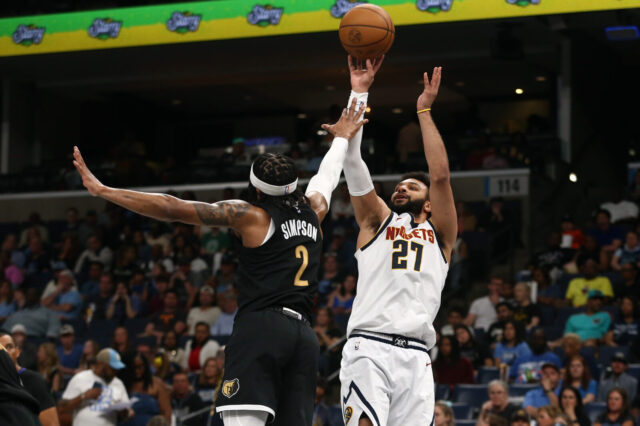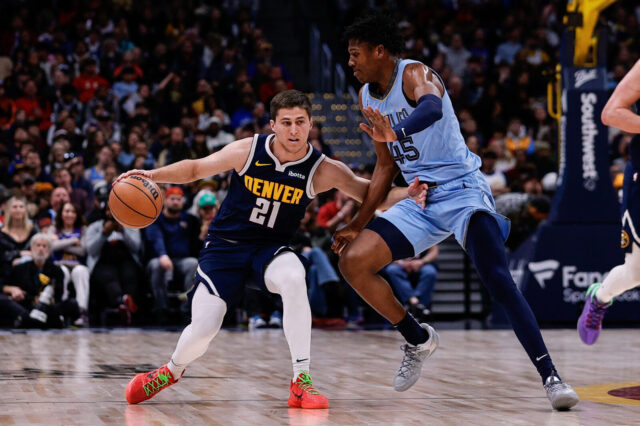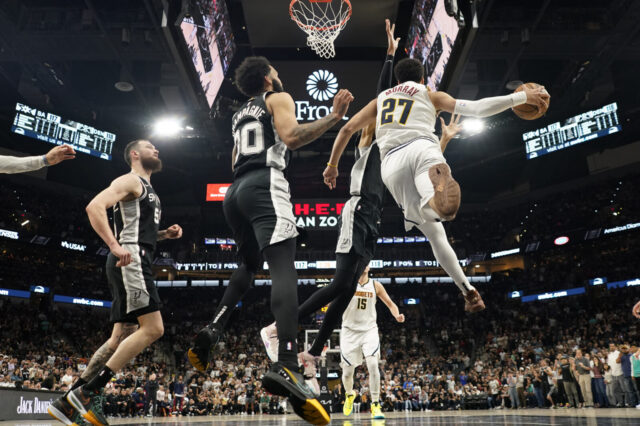During a recent appearance on my friend Sandy Clough’s morning radio show, the topic of small market teams paying the NBA’s onerous luxury tax came up. Sandy and I were discussing how the Oklahoma City Thunder had basically closed their championship-contending window by trading away James Harden in 2012 simply to avoid paying luxury tax (the NBA’s dollar-for-dollar penalty for team’s whose payroll far exceeds the salary cap). Sandy then asked me if the Nuggets owners – Josh and Stan Kroenke – would ever pony up for a championship, even if it meant paying well into the luxury tax.
To answer Sandy’s question, I basically said “if given the opportunity to pay the tax – i.e. the Nuggets have players worth paying the tax for – I hope they would” and I referenced the 2007-08 season when the Nuggets boasted the NBA’s second-highest payroll at $84 million which came with a $20 million-something tax penalty. That season, the Nuggets’ roster featured two first overall picks (Allen Iverson and Kenyon Martin), a second overall pick (Marcus Camby), a seventh overall pick (Nene Hilario) and, of course, a third overall pick (Carmelo Anthony). But despite the plethora of high draft picks and the extremely high payroll (by comparison, the Nuggets pay about $67 million in payroll today), all the 2007-08 Nuggets could produce was a first round playoff sweep by the Los Angeles Lakers as an eighth seed.
In the wake of that colossal disappointment, the Nuggets moved towards a more fiscally prudent approach and actually got better. Just months removed from that 2008 playoff exit, gone were Iverson and Camby (and their giant salaries) and in their place were Chauncey Billups and a collection of solid role players on minimum one-year contracts, like Dahntay Jones and Chris Andersen. With Billups leading the way and head coach George Karl leaning on his players to focus more on defense than ever before, the Nuggets came within two games of their first NBA Finals appearance at the conclusion of the 2008-09 campaign.
But rather than ride that wave of success for years to come, Karl's second bout with cancer cost the Nuggets a solid 2009-10 playoff run and by the beginning of the 2010-11 season, the rumors of Anthony's impending departure to New York were in full throttle. The "Melodrama" proved to be a giant distraction for the Nuggets up to and until the day Anthony was finally traded to New York in February of 2011, and the team the Nuggets built in his wake have continued the Nuggets run of playoff appearances despite being "star-less."
Nuggets fans and devout readers of this site know this story all too well, but I think it captures everything that the Nuggets – and their small market NBA peers – are up against in the modern NBA. The Melo Tale brings up issues of tanking, luxury tax, free agency and colluding to win titles that every NBA team must deal with.
Before the Nuggets were even in a position to assemble that 2007-08 roster with all those juicy lottery picks (and bloated contracts), they had to tank the 2002-03 season. In what was known back then as “The LeBron James Sweepstakes”, the Nuggets threw away the 2002-03 campaign hoping to land The King, but instead settled for Anthony as the consolation prize when – despite winning just 17 games – the Nuggets picked third overall in the 2003 NBA Draft.
For Nuggets fans, this was eerily similar to previous tanking jobs that never once netted a first overall pick. The Nuggets threw away the 2001-02 season but instead of drafting Yao Ming at one they ended up with Nikoloz Tskitishvili at five. The garbage 1997-98 Nuggets also missed on the first pick and instead were given the third pick, which became Raef LaFrentz (the first pick that year was Michael Olowokandi, who regrettably the Nuggets might also have drafted, so maybe it was good the Nuggets didn’t get the first pick in 1998). And before those tank jobs, the Nuggets tanking attempts in 1996-97 (Nuggets took Tony Battie at five instead of Tim Duncan at one), 1992-93 (Nuggets took LaPhonso Ellis at five instead of Shaquille O’Neal at one) and 1991-92 (Nuggets took Dikembe Mutombo at four instead of Larry Johnson at one) all failed to produce the desired result.
Point being, the tanking-and-drafting of Carmelo Anthony was yet another example of why tanking sort of works but is no guarantee of anything other than marginal playoff success.
Which brings us to the luxury tax issue. In order to build a winner around the Carmelo Anthonys of the NBA world, NBA owners must be willing to do whatever it takes – and pay whatever it costs – to get there. While the Nuggets were loading a roster around Anthony that featured high lottery picks and expensive free agents (like Martin and Andre Miller a season before him), the Cleveland Cavaliers and Miami Heat were doing the same for James and Dwyane Wade, respectively. Even the Toronto Raptors did their best – at the time – to build a winner around Chris Bosh, once netting 47 wins.
And yet between Denver, Cleveland, Miami and Toronto it was only Miami that was able to persuade Wade to stay beyond his first two contract extensions, as the Heat (and Wade himself) cajoled James and Bosh to join Wade in Miami. Which, of course, led to Anthony to want a "sexy market" team of his own – hence the "Melodrama" that ultimately sent Anthony to New York during the first season of the James, Wade and Bosh Era in Miami.
Left in the midst of all this has been our Denver Nuggets, who – to their credit – have produced a team almost as competitive as that 2008-09 squad despite having no All-Stars and not needing to tank again, like Cleveland did almost immediately after James’ departure and still can’t win a game to this day as a result. But history seems to be repeating itself in Denver, with yet another “star” player – Andre Iguodala – deciding to depart Denver for Golden State this past off-season (but karma’s a bitch, right Andre?), a move that might turn Denver from a 57-win team to a playoff bottom-feeder, leaving Nuggets fans to debate daily about what direction the Nuggets should be taking going forward. Again.
Meanwhile, unable to collude for a title with friends of his own in New York, Anthony has instead been saddled with a roster of aging, expensive players which lost in the playoffs’ second round last season and currently stands at a pathetic 3-10 so far this season in a weakened Eastern Conference, no less. All of this is leading to “Melodrama 2.0” with Anthony’s pending free agency at season’s end. The rumor, of course, is that Anthony might join forces with Kobe Bryant as a Laker in 2014-15, but that possibility just became a lot more remote with Bryant signing a two-year, $48.5 million extension on Monday.
So when Carmelo Anthony takes to the Pepsi Center floor on Friday night to face the franchise that drafted him, developed him, coddled him and spared no expense to win with him for nearly eight years, one has to wonder if Anthony feels just a twinge of regret. Because in his haste to collude for a championship elsewhere, Anthony has only further playoff disappointments and a current 3-10 record to show for it while the scrappy Nuggets appear to be weathering another star free agent departure and are hanging in a brutally tough Western Conference at a respectable 7-6.
The Carmelo Anthony saga is one of countless examples that small market teams like the Nuggets must endure in the modern NBA. And while I will forever hope that the Nuggets can break the vicious cycle of tanking-for-a-star-only-to-see-the-star-sign-with-a-big-market-team-elsewhere, when seeing Anthony in that Knicks jersey on Friday night it’s hard to be optimistic.


